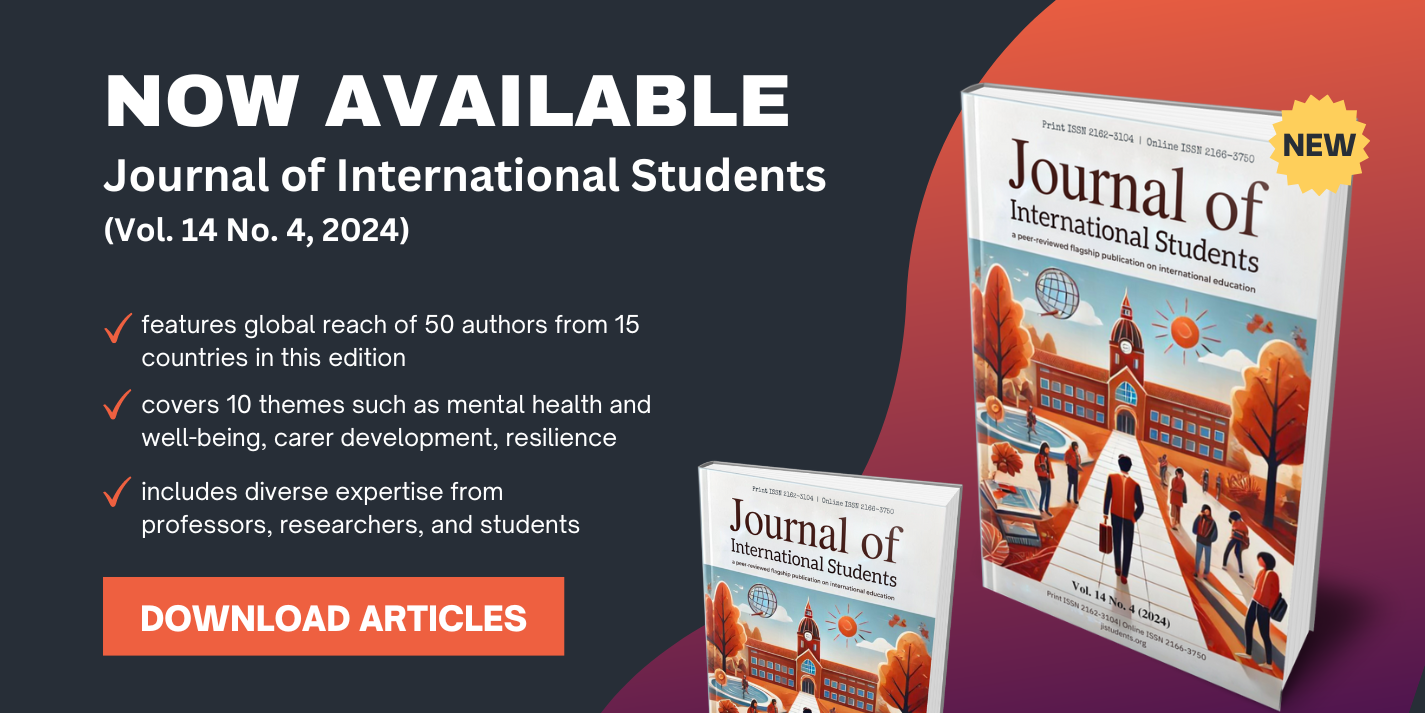Center for Global Education, The University of Tokyo, Japan

CALL FOR ABSTRACTS:
Building Inclusive Futures: The Intersection of Diversity, Equity, and Sustainable Development in International Education
Editor:
Doris Zhang, PhD
Project Assistant Professor, Center for Global Education,
The University of Tokyo
Email: dzhang@g.ecc.u-tokyo.ac.jp
Scientific Committee for the Special Issue Publication
- Dr. Yujin Yaguchi, Director, Center for Global Education, The University of Tokyo
- Dr. Yuki Ohara, Associate Professor, Center for Global Education, The University of Tokyo
- Dr. Kimberly A. Noels, Professor, Department of Psychology, University of Alberta
- Dr. Rui Zhang, Associate Professor, Psychology, Dickinson College
In partnership with the Center for Global Education at the University of Tokyo, we invite contributions for a special edition on Building Inclusive Futures: The Intersection of Diversity, Equity, and Sustainable Development in International Education. This issue seeks to explore how international education can promote inclusive, equitable, and sustainable practices in alignment with the United Nations Sustainable Development Goals (SDGs). We welcome submissions that critically engage with themes such as international student support services, intercultural competence, sustainable education, and ethical internationalization.
Submissions may include original research articles, case studies, and reviews that focus on fostering diversity, equity, and sustainability within international student communities. Manuscripts should align with the journal's focus on advancing knowledge in under-researched areas of international education, particularly those centered on marginalized populations and perspectives from the Global South.
Research shows that international students significantly benefit from support services that prioritize inclusivity and equity, contributing to their academic success and overall well-being (Pawar & Dasgupta, 2024). The integration of sustainability goals, such as those outlined in the United Nations Sustainable Development Goals (SDGs), into the framework of international education, is essential for fostering global citizenship and social responsibility (Nguyen, 2024; Zhang & Cao, 2024). Intercultural competence and identity formation are crucial for international students as they navigate transnational educational systems (Hou et al., 2024).
This issue will provide a platform for scholarly work exploring how international education can contribute to Sustainable Development Goals (SDGs), particularly SDG 4, which advocates for inclusive and equitable quality education (Nguyen, 2024). We invite contributions that critically examine how educational institutions can create more inclusive and sustainable learning environments for international students.
Suggested Topics
- International Student Support Services and Value-Added Components: Exploring which support services add the most value from the students’ perspectives and enhance equity (Pawar & Dasgupta, 2024).
- Diversity and Equity in International Education: Addressing institutional practices that support inclusivity and equity for international students, especially in transitioning education systems (Cutri, Bunnell, & Poole, 2024).
- Sustainable Development Goals (SDGs) and International Education: How international students and scholars contribute to global sustainability initiatives and align with SDG principles (Nguyen, 2024).
- Cultural Competence and Identity Formation: Examining the reconstruction of student identity in transnational educational contexts and how institutions can better support this process (Hou, Cruz, Ichikawa, & Glass, 2024).
- Technological Innovations and Sustainable Education: The role of innovative technologies in enhancing sustainable practices in higher education, with a focus on international collaboration (Jakubakynov et al., 2024).
- Global Leadership and Institutional Strategies: How leadership within higher education institutions can promote internationalization while supporting inclusive and equitable educational outcomes (Wang, Yao, & Liu, 2024).
- Internationalizing the Curriculum: How scholars and faculty members can internationalize the curriculum to meet the needs of both international and domestic students (Leask, 2013).
Tentative Timeline:
- Abstract Submission Deadline: Feb 15
- Abstract notifications: March 15, 2025
- Full Manuscript Submission Deadline: June 30, 2025
- Peer Review Notification: August 15, 2025
- Publication Date: September 15, 2025
Abstract Submission Portal (not receiving new submissions)
Manuscript Types
Research Articles (English)
Research Articles (4,500-7,500 words) submissions use quantitative, qualitative, or mixed methods research to make significant advancement in under-researched aspects of the field related to topics outlined in the journal's Aims & Scope.
Research in Briefs (English)
The "Research in Brief" section of the Journal of International Students is designed for concise analyses of specific topics or questions, using new or existing data sources. Articles should include a brief introduction, a discussion of the data, up to two figures/tables, a maximum of 10 references, and be within 2,000 words. Titles should be under 10 words, and an abstract of 120 words or less is required and manuscripts undergo standard peer review.
Submission Process:
Manuscripts should be submitted through the Journal of International Students' online submission system, adhering to the journal's formatting and referencing style.
All authors contributing to this special issue will receive a special publication rate, including grants, discounts, and waivers available as applicable.
For inquiries about this Special Issue, please contact the Project Editor:
Doris Zhang, PhD
Project Assistant Professor, Center for Global Education,
The University of Tokyo
Email: dzhang@g.ecc.u-tokyo.ac.jp
Resources for Authors/Editors:
References
- Cutri, J., Bunnell, T., & Poole, A. (2024). International education in transition: perceptions of expatriate leadership at a Chinese school delivering an Australian curriculum. Compare: A Journal of Comparative and International Education.
- Hou, M., Cruz, N. I., Ichikawa, A., & Glass, C. R. (2024). Self-formation across borders: transnational students’ identity reconstruction while transitioning from international schools to higher education. International Studies in Sociology of Education.
- Jakubakynov, B., Tolegenuly, N., Naribai, R., Nurzhanova, Z., & Shcherban, T. (2024). Innovative technologies in higher education: developing international cooperation in professional training. Globalisation, Societies and Education.
- Nguyen, C. H. (2024). The expectancy and value of international education among Vietnamese doctoral students in Malaysia. Cogent Education.
- Pawar, S. K., & Dasgupta, H. (2024). International student support service components that add value from the student’s perspective: the case of Indian higher education. Cogent Education.
- Wang, J., Yao, H., & Liu, W. (2024). University presidents’ international education experience and the internationalization of higher education institutions: a study of leadership in China. Asia Pacific Journal of Education.
- Leask B. (2013). Internationalization of the curriculum and the disciplines: Current perspectives and directions for the future. Journal of Studies in International Education, 17(2), 99–102.
- Zhang, Q., & Cao, Y. (2024). The evolution and discourse of higher education internationalization since the 21st century: controversies, criticisms, and current trends. Cogent Education.
Download recent articles from the latest edition:
















